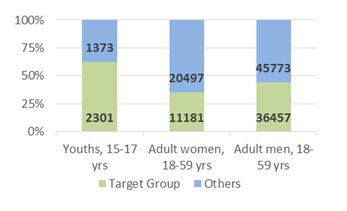Livelihoods in Malaysia
Livelihoods in Malaysia
Investing in people's livelihoods is also important because it helps cut the cost of aid and protection and enhances the chances for a sustainable durable solution, be it return, local integration or resettlement. Most importantly, it allows refugees to rebuild their lives in dignity.
Being forced from one's home does not mean that somebody must become totally dependent on aid in their place of exile, be it in a camp or an urban setting.

Highlights
|
298 Refugee households benefitted from financial assistance in 2017. |
54 Refugees benefitted from microenterprise development in 2017. |
134 Refugees benefitted from technical, vocational and educational training in 2017. |
20 Refugee community groups are benefitting from various livelihoods initiatives. |
Livelihoods Strategy
- Objectives: Right to work and to establish strong representative refugee community based organizations towards self-reliance.
- Strategic objectives:
- Advocacy for the Right to Work
- Community-Based Organisations’ capacity-building for social protection
- Livelihood stakeholder network development
- Financial assistance and psycho-social support for the most vulnerable
- Self-reliance monitoring and project quality control
Priority target groups

From an overall total population of some 150,000 refugees, breakdown of target groups for livelihoods intervention:
Target Group (Tier 1): Myanmar (Rohingya), Syrian, Iraqi, Palestinian, Pakistani (Ahmadi), Yemeni, Somali (Central & South Somalia), Sudanese, Afghan
Main activities (Jan - June 2017)
Livelihoods Provision (Financial Assistance for most vulnerable persons)
- Request: 607 applications for financial assistance received; 170 applications were referred for home visits.
- Assessed: 91 applications were assessed using the Livelihoods Vulnerability Assessment Tool; 158 families were assessed through house visits.
- Assisted: 38 households/94 individuals received emergency financial assistance under direct implementation; 68 households/204 individuals received financial assistance under partner implementation
- Monitoring & Evaluation: Orientation & Training were provided to 102 staff & volunteers of NGO partner Buddhist Tzu Chi Foundation, regarding UNHCR policies, profile of the target population for cash based intervention, and assessment tools.
Livelihoods Protection (Vocational Skills Training, Income Generating Activities & Micro Entrepreneurship projects)
- Refugees Identified: 357 persons were identified and referred for various projects under CBOs, Service Providers & Partners
- Refugees Selected: Of the 197 identified, 78% were selected to participate in the afore-mentioned projects.
- Monitoring & Evaluation: 126 refugee households in the microenterprise development project underwent pre-screening by Muslim Aid, and 88 were selected with 58 households actively participating.
Livelihoods Promotion (Advocacy, Employment Counselling, Refugee verification, basic Saving Services & Networking)
- Access to Wage Earning Opportunities: 590 refugees assisted.
- Access to Financial Institution: 378 refugees assisted.
- CBO Capacity Building: SPF proposals were received from 9 community based organizations.
- External Stakeholders Support for community projects:
- Heritage Project: Eight businesses (Nathalie Gourmet Studio, White Box & Black Box at Publika, BSyncLive, Creative Twist, FTalent, Allegro Studio, APW Bangsar, ABD Resources & Supply) contributed space, sponsorships, manpower, and expertise.
- Community Crafts Project: UNIQLO, Stitch A Giggle, and Ginger Batiks are potential clients
Working with partners
- UNHCR Malaysia currently works with local institutions, social enterprises and NGOs to provide livelihood and development assistance to individuals and communities of concern.
- Partners (IP): Taiwan Buddhist Tzu Chi Foundation Malaysia, Yayasan Kemanusiaan Muslim Aid Malaysia (YKMAM) & the National Association of Women Entrepreneurs Malaysia (NAWEM).
- Operational Partners: Snips College of Creative Arts (SCCA), ST Foundation.
- Partner outreach: Sze Women of Hope, Yayasan Pendidikan Vokasional Wanita Malaysia, Erican College, Training Minds, ManagePay Systems, Universiti Teknologi Mara (UiTM), Ftalent.
- Livelihoods Sector Network: 48 active organizations comprising Social Enterprises, NGO/FBO, CSRs linked to Businesses and CBOs.
Challenges
Based on data from a baseline Socioeconomic Study (2016) by PWC:
Reported key impediments to higher income employment include:
- Lack of legal status (72%)
- Language barriers (44%)
- Lack of skills (35%)
Employment, Income, Expenditure, Savings & Debt:
- Within households, about half of household members of working age were unemployed
- Only 23% of women employed compared to 72% of men
- Average household income MYR1,127 a month
- 46% households indicated the existence of debt. Daily and emergency needs are noted as the primary reasons for borrowing money. Across all groups, debt is predominantly owed to friends and family
Safety & Security:
- 49% of households reported facing police harassment and 69% of respondents experienced transportation challenges getting around Kuala Lumpur and the Klang Valley
Others:
- Limited access to financial institutions, lack platform for refugee artisans to develop and sell their products.

